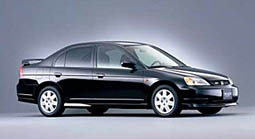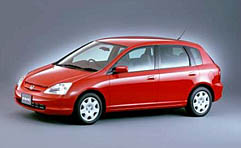

The first generation Honda Civic with a wheelbase of 220 cm arrived in July, 1972 as a shortbacked 2-door, accompanied in November, 1972 by a 3-door Hatchback. A 4-door came in December, 1973 with a wheelbase of 228 cm; it lasted until September, 1977 that the 5-door Hatchback was introduced. By November, 1974 a 5-door Wagon was released on the same 228 cm wheelbase, however with a rigid rear axle and leaf springs instead of the independent coil suspension.
The second generation Civic in the same style as the first rode on a wheelbase of 225 and 232 cm respectively for the 3-door and 5-door Hatchbacks and was introduced in July, 1979. In October, 1979 came the 5-door Wagon, which was now available with the independent rear coil suspension, as well as the rigid axle with leafs. In September, 1980 a 4-door Notchback arrived. In the meantime, in August, 1980 the Honda Ballade was released with a different body, also a 4-door Sedan, and built as Triumph Acclaim in England. A derivative of the Civic was the Honda Quint (Export: Quintet) 5-door Hatchback with a wheelbase of 236 cm.
The third generation Civic, introduced in September, 1983 consisted of 4 body styles, with only the 3-door Hatchback and the 4-door Sedan having interchangeable panels. The 3-door Hatchback now rode on a 238 cm wheelbase; the 4-door Sedan, also called Honda Ballade, and built in England as Rover 213/216 (June, 1984) rode on a 245 cm wheelbase. The Wagon was now called Shuttle and used the same 245 cm wheelbase. The Civic CR-X, called Ballade Sports in Japan was a 3-door Coupe, riding on a 220 cm wheelbase and was already introduced in June, 1983. All cars had a new front and rear suspension, torsion bars instead of coils in front, and a torsion beam axle with coil springs at the rear. By November, 1984 a 4-wheel-drive version arrived for the Shuttle with a live rear axle, by September, 1986 the system became permanent. A derivative was the Quint Integra, which arrived as a 3-door Hatchback on a 245 cm wheelbase in February, 1985. In November, 1985 came the 5-door Hatchback on a 252 cm wheelbase, and in October, 1986, in Japan a 4-door Sedan on the same 252 cm wheelbase. The cars were called Honda Integra in the export, and Acura Integra in the USA and Canada.
The fourth generation arrived in September, 1987 with the same body layout as the previous generation, the wheelbase was now 250 cm integrally, except for the 3-door Coupe, now called Honda CR-X on a 230 cm wheelbase. The suspension was now double wishbones, coils, front and rear, also for the 4WD. A derivative was the Concerto 4-door Sedan and 5-door Hatchback, which arrived in June, 1988 and rode on a 255 cm wheelbase. The 5-door Hatchback was built in England as Rover 200 from October, 1989, the 4-door Sedan as Rover 400, from March, 1990. Rover developed a 200 3-door Hatchback (September, 1990), a 2-door Convertible (March, 1992), a 2-door Coupe (October, 1992) and a 5-door Wagon (March, 1994). The new Honda Integra arrived in April, 1989 as 3-door Coupe as well as a 4-door Pillared Hardtop on a 255 and 260 cm wheelbase respectively.
The fifth generation Civic was released in September, 1991, the 3-door now on a 257 cm wheelbase, the 4-door (called Civic Ferio in Japan) on a 262 cm wheelbase, the CR-X (called del Sol in the USA), now a 2-door Targa-Top on a 237 cm wheelbase. The previous generation Shuttle remained available. A 2-door Coupe (257 cm wheelbase), developed in the USA, arrived for the 1993 model year. By November, 1992 the Honda Domani 4-door Sedan arrived with different body, also sold as Isuzu Gemini from August, 1993. This car was built in England as Rover 400 with different roof end from May, 1995, where a 5-door Hatchback was developed, which was also sold as Honda Civic in Europe. These cars were rebadged Rover 45 by January, 2000 when they received a nostalgic front. By Spring 1998 arrived a 5-door Wagon, as Honda Civic Aerodeck in Europe. The new Integra 3-door Coupe and 4-door Pillared Hardtop arrived in May, 1993 and rode on a 257 cm and 262 cm wheelbase respectively.
The sixth generation Civic appeared in September, 1995 as a 3-door Hatchback, a 4-door Sedan, and a 2-door Coupe, now all riding on the 262 cm wheelbase. The 4-door was still called Civic Ferio in Japan, by February, 1996 it came as Honda Integra SJ, by January, 1997 as Honda Domani, and by February, 1997 as Isuzu Gemini. A 5-door Wagon came in February 1996, called Honda Orthia, or in a more commercial version, as Honda Partner. In Canada the 4-door Sedan is also sold as Acura EL. In Thailand the car is known as Isuzu Vertex.


The seventh generation Civic came in September, 2000 now as a 5-door Hatchback and a 4-door Sedan (Civic Ferio) with different bodies and the 262 cm wheelbase for the Sedan and a 268 cm wheelbase for the Hatchback. In October, 2000 arrived the 7-seater Honda Stream with an even longer wheelbase of 272 cm. In late 2000 arrived the USA-built 2-door coupe on the 262 cm wheelbase. In 2001 a 3-door Hatchback was added on a wheelbase of 257.5 cm
Please have your comments.
Homepage
Far East Auto Literature, 1998-2001